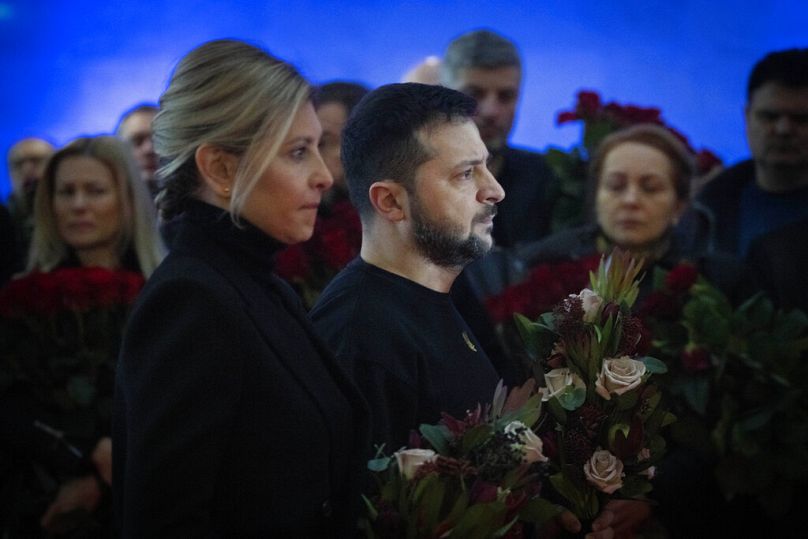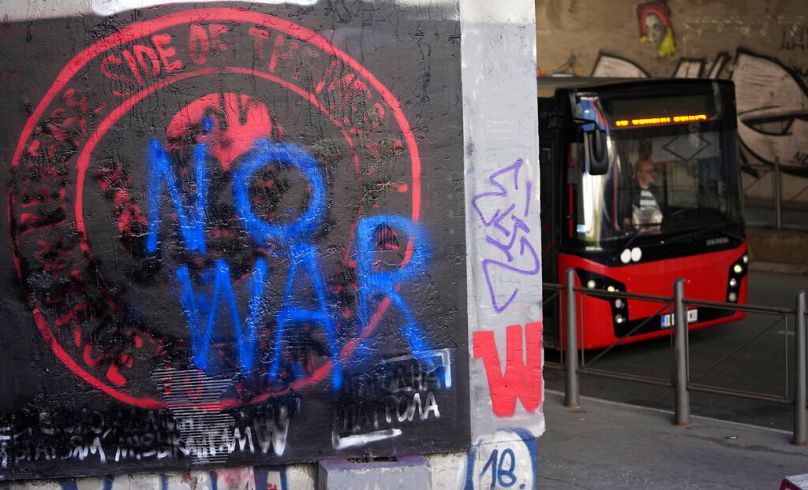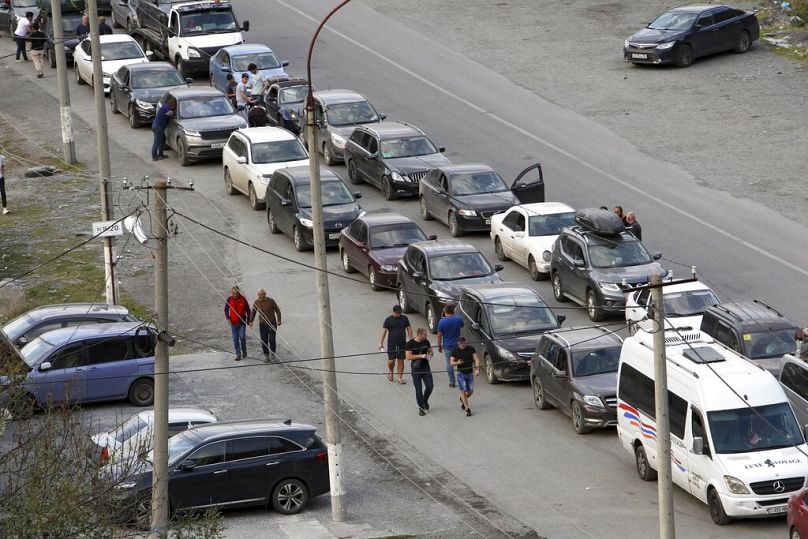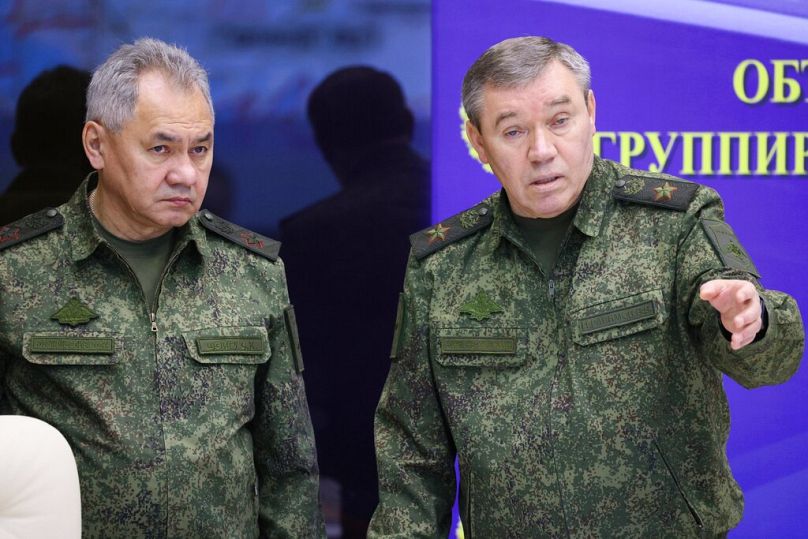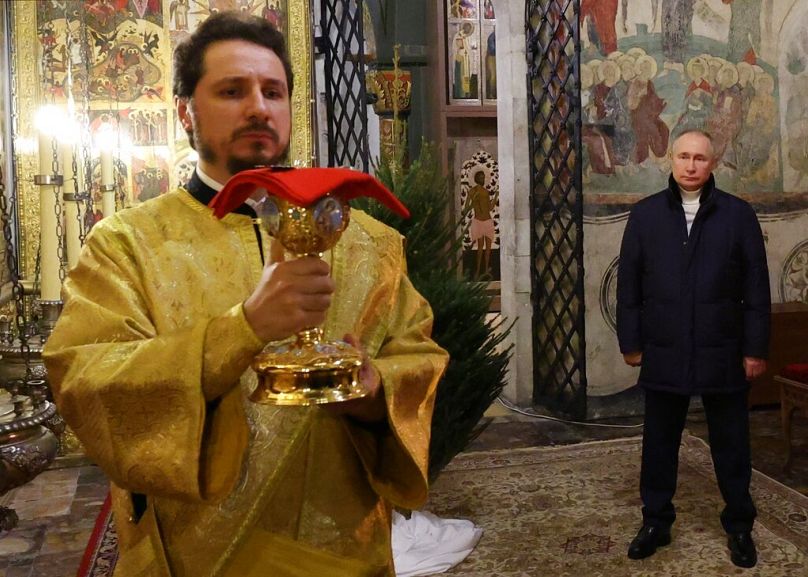Here are the latest developments in Russia's invasion of Ukraine.
1. Deliver the tanks to Ukraine, NATO chief tells allies in Berlin
NATO Secretary General Jens Stoltenberg urged allies on Tuesday to speed up deliveries of heavy and more advanced weapons to repel Russian forces in Ukraine and expressed confidence that a decision on sending battle tanks to Kyiv would come soon.
 ADVERTISEMENT
ADVERTISEMENT
 ADVERTISEMENT
ADVERTISEMENT
Stoltenberg was speaking in Berlin alongside Germany's new defence minister, Boris Pistorius, who said his government would act quickly on the tanks if a consensus were to be found.
Pressure has been building on German Chancellor Olaf Scholz's government to send its Leopard tanks to Ukraine and allow other countries to do the same -- under military procurement rules, Germany must authorise any re-exports.
But Scholz's Social Democrat party has been holding back, wary of sudden moves that could cause Moscow to escalate further.
Poland, which has accused Germany of dragging its heels on the tanks, said on Tuesday it had formally requested permission from Berlin to re-export its Leopard tanks to Ukraine.
"At this pivotal moment in the war, we must provide heavier and more advanced systems to Ukraine, and we must do it faster," NATO's Stoltenberg told reporters.
"I therefore welcome our discussion today. We discussed the issue of battle tanks. Consultations among allies will continue and I'm confident we will have a solution soon," Stoltenberg added.
Pistorius said Germany was not standing in the way of other countries training Ukrainian troops to use the Leopard tanks while talks continued. He said it was wrong to say that "there's disunity or that Germany is isolated".
Scholz was trying to forge consensus on the tanks issue, he said, adding that NATO must not become party to the war in Ukraine.
Germany's foreign minister Annalena Baerbock had signalled a possible breakthrough on Sunday when she said her government would not stand in the way if Poland wanted to send its Leopard 2 tanks to Ukraine.
But on Tuesday, a German foreign ministry official appeared to temper those remarks by saying that Scholz would decide on sending the tanks.
2. Zelenskyy's anti-corruption purge results in series of high-profile resignation
Several senior Ukrainian officials resigned on Tuesday in the biggest leadership shakeup of the war with Russia so far, in what an aide to President Volodymyr Zelenskyy called an answer to public calls for "justice".
Some, though not all, of the resignations were linked to corruption allegations. Ukraine has a history of graft and shaky governance and is under international pressure to show it can be a reliable steward of billions of euros in Western aid.
"There are already personnel decisions -- some today, some tomorrow -- regarding officials at various levels in ministries and other central government structures, as well as in the regions and in law enforcement," Zelenskyy said in an overnight video address.
Zelenskyy aide Mykhailo Podolyak tweeted: "The president sees and hears society. And he directly responds to a key public demand – justice for all."
Among those stepping down or fired on Tuesday morning were a deputy prosecutor general, a deputy defence minister and the deputy chief of staff in Zelenskyy's own office.
The changes came two days after a deputy infrastructure minister was arrested and accused of siphoning off about €360,000 from contracts to buy generators, one of the first big corruption scandals to become public since the war began 11 months ago.
The Defence Ministry said Deputy Defence Minister Vyacheslav Shapovalov, responsible for supplying troops, had resigned on Tuesday morning as a "worthy deed" to retain trust after media accusations of corruption which he and the ministry rejected.
It followed a newspaper report that the ministry overpaid for food for troops, which the ministry and its supplier both denied.
Though Zelenskyy did not name any officials in his address, he announced a ban on officials taking holidays abroad.
"Ignoring the war is a luxury no one can afford," he said. "If they want to rest, they will rest outside the civil service."
The changes are a rare shakeup of an otherwise notably stable wartime leadership in Kyiv. Apart from purging a spy agency in July, Zelenskyy had mostly stuck with his team.
Kyiv says a surge in patriotic feeling has dampened corruption since Russia's invasion. But the head of Zelenskyy's Sluga Narodu or Servant of the People party promised on Monday that officials would be arrested in a coming anti-corruption drive, which would resort to martial law if necessary.
3. Norway questioned fleeing Wagner mercenary over alleged war crimes, authorities say
Norwegian police have begun questioning a former commander of Russia's Wagner mercenary group who recently fled to Norway about his time in Ukraine, police said on Tuesday.
Andrei Medvedev, who escaped from Russia by crossing the Russian-Norwegian border, has said he fears for his life after witnessing what he said was the killing and mistreatment of Russian prisoners brought to the front lines in Ukraine to fight for Wagner.
Kripos, Norway's national criminal police service, which has responsibility for investigating war crimes, has begun questioning him about his experiences in Ukraine.
"Kripos can confirm that Andrei Medvedev has been questioned," it said in an emailed statement to Reuters.
"We do not want to go into what he has explained in these interviews, but specify that he still has the status of a witness."
Medvedev's Norwegian lawyer, Brynjulf Risnes, was not immediately available for comment.
Kripos is part of the international effort to investigate war crimes in Ukraine conducted by the International Criminal Court.
"He has previously said that he was part of the Wagner group, and it is interesting for Kripos to get more information about this period," Kripos added, declining to give further details.
On Monday, Medvedev was detained by immigration police due to "disagreement" about measures taken to ensure his safety.
4. Russia to amend law on exiting the country
Planned amendments of Russia's transportation law will make it mandatory for people to book a time and place for any intended crossing of the border by car, the TASS news agency reported, raising the possibility of new restrictions on travel.
"The passage of vehicles ... in order to cross the state border of the Russian Federation is carried out on a reserved date and time in accordance with the procedure established by the government," the agency said later on Monday, citing a draft amendment it said was due to come into force on 1 March.
Following Russia's invasion of Ukraine in February last year, many Russian citizens and residents fled from the country, with the number growing significantly after the government declared the mobilisation of some 300,000 personnel for the military in September.
While precise totals are not available, the number of Russians who have left could run into hundreds of thousands, according to media reports and figures released by neighbouring countries.
The amendments to the law covering border crossings were prepared by the Committee on Transport and Infrastructure Development of the State Duma, Russia's lower house of parliament, TASS reported.
It was not clear when the required readings of the draft amendments would take place.
5. Russia's Ukraine war commander announces military reforms, blames the West
Russia's new military reforms respond to possible NATO expansion and the use of Kyiv by the "collective West" to wage a hybrid war against Russia, the newly appointed general in charge of Russia's war in Ukraine said.
Valery Gerasimov, in his first public comments since his 11 January appointment to the role, also admitted to problems with the mobilisation of troops after public criticism forced President Vladimir Putin to reprimand the military.
The military reforms, announced mid-January, have been approved by Putin and can be adjusted to respond to threats to Russia's security, Gerasimov told the news website Argumenty i Fakty in remarks published late Monday.
"Today, such threats include the aspirations of the North Atlantic Alliance to expand to Finland and Sweden, as well as the use of Ukraine as a tool for waging a hybrid war against our country," Gerasimov, who is also the chief of Russia's military general staff, said.
Finland and Sweden applied last year to join the North Atlantic Treaty Organisation after Russia invaded Ukraine.
Under Moscow's new military plan, an army corps will be added to Karelia in Russia's north, which borders Finland.
The reforms also call for two additional military districts, Moscow and Leningrad, which existed before they were merged in 2010 to be part of the Western Military District.
In Ukraine, Russia will add three motorised rifle divisions as part of combined arms formations in Kherson and Zaporizhzhia regions, parts of which Moscow claims it annexed in September.
"The main goal of this work is to ensure guaranteed protection of the sovereignty and territorial integrity of our country," Gerasimov said.
Gerasimov added that modern Russia has never seen such "intensity of military hostilities", forcing it to carry out offensive operations to stabilise the situation.
"Our country and its armed forces are today acting against the entire collective West," Gerasimov said.
In the 11 months since invading Ukraine, Russia has been shifting its rhetoric on the war from an operation to "denazify" and "demilitarise" its neighbour to increasingly casting it as "defence" from "an aggressive West".
The Kremlin has offered no concrete proof for its claims.
Gerasimov and the leadership of the defence ministry have faced sharp criticism for multiple setbacks on the battlefield and Moscow's failure to secure victory in a campaign the Kremlin had expected to take just a short time.
The country mobilised some 300,000 additional personnel in the fall proceeded chaotically.
"The system of mobilisation training in our country was not fully adapted to the new modern economic relations," Gerasimov said. "So I had to fix everything on the go."
6. Kyiv doles out further sanctions against Russian Orthodox Church affiliates
Ukraine has imposed sanctions on 22 Russians associated with the Russian Orthodox Church for what President Volodymyr Zelenskiy said was their support of genocide under the cloak of religion.
According to a decree issued by the National Security and Defense Council of Ukraine, the list includes Mikhail Gundayev, who represents the Russian Orthodox Church in the World Council of Churches and other international organizations in Geneva.
Russian state media reported that Gundayev is a nephew of the leader of the Russian Orthodox Church, Patriarch Kirill. Ukraine sanctioned Kirill last year.
The sanctions are the latest in a series of steps Ukraine has taken against the Russian Orthodox Church, which has backed President Vladimir Putin's invasion of Ukraine that is now entering its 12th month.
"Sanctions have been imposed against 22 Russian citizens who, under the guise of spirituality, support terror and genocidal policy," Zelenskiy said in his nightly address late on Monday.
He said the punitive measures said that they would strengthen the country's "spiritual independence".
A majority of Ukrainians are Orthodox Christians and competition has been fierce between the branch of the church historically linked to Moscow and an independent church proclaimed after independence from Soviet rule in 1991.











